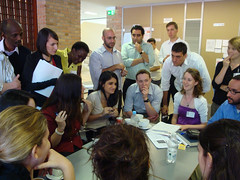A few months ago, I wrote an essay about reconciliation in Bosnia and Herzegovina in which I presented a critique of the limitations of the Dayton Peace Accord (“the Accord”). Today, I participated in a simulation of a peace conference in spring 1993, which gave me a new view of the agreement and the general challenges encountered when negotiating peace agreements.
 Given that a majority of peace agreements fail within 5 years of being signed, the fact that the Accord has lasted over a decade suggests that as well as containing unworkable elements, the Accord also contains workable elements. The presentation by IQ-Consult a few days ago on social entrepreneurship emphasized that in working with communities it is vital to focus on building on their strengths. In line with this principle, I would like to take another look at the Accord and identify its strengths and associated conflict prevention activities.
Given that a majority of peace agreements fail within 5 years of being signed, the fact that the Accord has lasted over a decade suggests that as well as containing unworkable elements, the Accord also contains workable elements. The presentation by IQ-Consult a few days ago on social entrepreneurship emphasized that in working with communities it is vital to focus on building on their strengths. In line with this principle, I would like to take another look at the Accord and identify its strengths and associated conflict prevention activities.
It is much easier to criticize than it is to come up with constructive solutions. I don’t want to be simply sitting on the sidelines, criticizing. A critical approach is valuable, but it also involves appreciating the positive points and having compassion for the challenges in negotiating the peace agreement and its subsequent implementation.
Some of the challenges I faced in the simulated negotiation of a peace agreement were:
- The relatively large number of participants and ideas versus the limited time in which to fully discuss the large range of options generated
- The question of how to ensure the warring parties have ownership of the process, decisions and outcomes
- Limited level of knowledge and experience in design of peace agreements and processes
- The difference between a peace agreement and a peace process, and having the task of generating concrete agreements to address immediate concerns (e.g. ceasefire to prevent further loss of life) as well as set off a peace process to resolve the more long term issues. A significant challenge arises due to interdependence of issues to be resolved. There is the temptation to just get the parties to stop fighting and agree to something; yet how effective is this in the long term? There are important ethical questions relating to time, because the longer the negotiation takes, the higher the cost in terms of lives lost. Do we negotiate for longer to get a ‘better’ peace agreement or do we settle for an imperfect peace agreement to prevent loss of lives and run the risk of locking in a peace where the violence has ended but where the chance of resolving deep resentments and hostilities is potentially severely blocked?
- How exactly to ensure accountability and prevent the ceasefire from simply being an interim period that allows parties to rearm and resume a more intensive conflict further down the track?
We somehow managed to muddle our way through the exercise. As you can see, I came out with more questions than answers. Although I built on what I know, the greatest benefit was learning more about what I don’t know and how to direct my studies in the future so I am better able to serve my communities.
Goranka Slavujevic, Croatia/Canada

